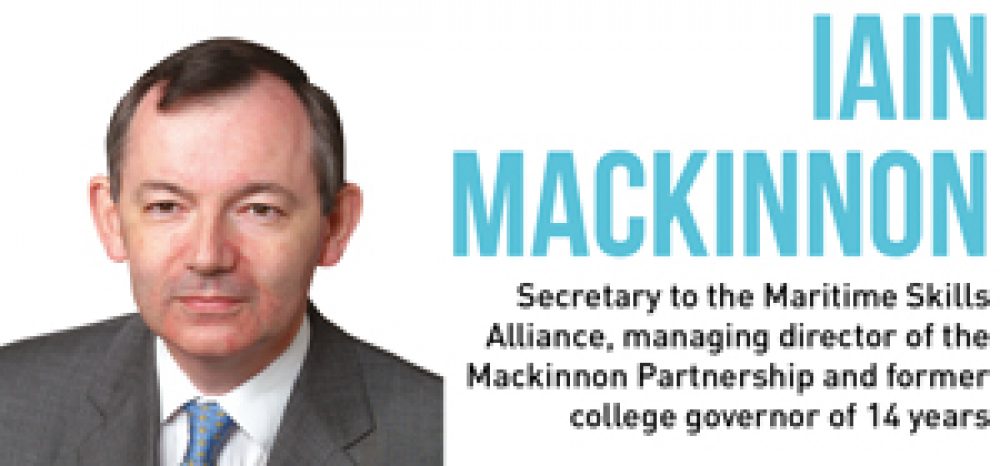Skills Minister Nick Boles told FE Week that he was willing to allow some apprenticeship to be graded as simply pass or fail, despite reforms seeming to have been heading in the direction of a pass, merit or distinction system. Iain Mackinnon explains why he welcomed the move.
he maritime sector has been one of those lobbying government to take a more flexible approach on grading, so we were delighted to see FE Week report that Skills Minister Nick Boles plans to do just that.
But is it a “U-turn,” or just good policy-making? Let me tell you more of the story, and let you decide.
As part-time Secretary of the Maritime Skills Alliance I was keen that the maritime sector bid to become a Trailblazer in Round Two.
I was concerned that none of the Round One Trailblazers was in an industry which was heavily regulated.
The Maritime and Coastguard Agency administers a worldwide convention which defines standards of competence for seafarers, and the results are widely accepted.
And even if they weren’t, they are the law. We needed to see “employer-led” read intelligently in the context of a heavily-regulated industry.
The maritime sector has, however, the huge advantage in Trailblazer terms that we have long worked to just the kind of standards of competence which Doug Richard recommended.
And because those standards are international, seafarers can use their certificates of competence to work anywhere in the world — a far bigger prize than a standard recognised only in England.
The sector is so heavily regulated because seafarers die every year. Last year was the safest 12 months ever for accidents at sea involving British seafarers, with just five fatalities — but that’s five too many, and we need constant vigilance to keep the number falling.
That’s why we were so concerned about the insistence by the Department for Business, Innovation and Skills (BIS) that apprenticeships must be graded.
The very strong belief of employers in the sector was that someone is either safe to be on board, or they are not. There can be no room for compromise, and no room for the sort of ambiguity which might creep in if one person was judged to be acceptable, and others more merit-worthy.
Mr Boles responded positively when we made our case to him, acknowledging our concerns and indicating that there was room for compromise.
We went back to him earlier this month, however, exasperated that over both grading and end-point assessment we were still being pushed towards an approach which employers — very emphatically — did not want.
We have a system which works for us, and one which fits the spirit of Mr Richard’s recommendation, but not the letter of the administrative requirements they have been translated into.
I know that we are not alone in our concerns, and certainly do not pretend that the maritime voice alone has led to the Minister shifting position.
We are not alone in our concerns, and certainly do not pretend that the maritime voice alone has led to the Minister shifting position
What’s happening here? BIS had the task of translating Mr Richard’s pretty broad-brush recommendations into administrative requirements. They chose an explicitly experimental approach, inviting groups of employers to be “Trailblazers” for the new system.
England is just small enough that policy-makers can get away with treating the whole country as a single entity, applying the same approach to everyone.
But if policy-makers dig in their toes too soon – usually to sound tough — they run the risk that their conclusions don’t fit all circumstances. With luck we get a Minister who listens when their tough stance bumps into unhelpful reality.
We have been particularly lucky to have three Skills Ministers in a row who listen. John Hayes set a fine example and then we had Matthew Hancock and now Mr Boles — two high flyers close to the government’s inner circle, with the personal and political self-confidence to shift their stance when they thought it justified.
We all want sensible policy-making where political leaders and their officials genuinely listen. Charles Clarke’s excellent new book, The Too Difficult Box, gives a number of examples where a little more humility earlier in the process would have made for better decisions.
So call this a “U-turn” if you want, but what really matters is that the government has listened to reasoned argument, and that we have a better policy.









A footnote following Nick Boles’ appearance before the Education Select Committee on 14th January. He said to them: “what we need to do is to have a pretty clear idea of what we think is going to be good but let’s not be overly-militant on insisting on it in every case”.
It would have saved us some time if BIS had started with that approach.
Iain Mackinnon